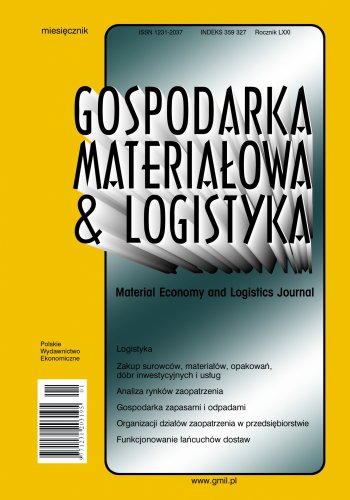Blockchain as a platform for a public logistic
Managers of the public sector are increasingly looking for new opportunities to offer residents a
larger package of benefits that contribute to improving the quality of life. One of them is public
logistics, which has the potential to integrate and coordinate activities in the implementation of
public tasks. However, public sector concerns regarding private performance of benefits are still
relatively high. This is due not only to the lack of confidence in the external performance of tasks, but
also to the lack of transparency in the relationship between the public and private sectors. This is
justified by agency theory. A way to improve relations and optimize the offer in the city can be
blockchain technology, which is a revolutionary and ground-breaking technology that promises to
change the way interactions between city stakeholders. It offers new alternatives not only to shape
city-society relations, increase public sector transparency, but also to facilitate the transmission of
confidential data without compromising privacy and security. In the article I will attempt to assess
the possibilities of using blockchain technology in the implementation of public tasks and in everyday
contacts of the public sector with stakeholders. I tried to show the possibilities of blockchain
technology in shaping the relationship between the public sector and society and entities from the
non-public sector involved in the implementation of public services.
References
Blockchain nie tylko w biznesie — praktyczne zastosowania technologii blockchain w sektorze
publicznym i organizacjach pozarządowych,
https://www.sparkbit.pl/pl/blockchain-biznesie-praktyczne-zastosowania-techno-logii-blockchain-
sektorze-publicznym-organizacjachpozarzadowych (1.02.2020).
https://doi.org/10.18276/epu.2017.126/2-01.
Bughin, J., Chui, M., Manyika, J. (2010). Clouds, big data, and smart assets: Ten tech-enabled business
trends to watch. McKinsey Quarterly, 1(56), s. 75.
Casey, M., Wong, P., Global supply chains are about to get better, thanks to blockchain. Harvard
Business Review, 13.03.2017,
https://hbr.org/2017/03/global-supply-chains-are-about-to-getbetter-thanks-to-blockchain. 21.01.
2020.
Di Gregorio, R., Nustad, S. (2017). Blockchain Adoption in the Shipping Industry. Copenhagen:
Master's Thesis, Copenhagen Business
School.
Ellis, D. (2017), Blockchain — The basis of a new paradigm for the supply chain. In Supply Chain
Thought Leadership; Sydney, Australia:
Gattorna Alignment.
Iansiti, M., Lakhani, K. R. (2017). The Truth about Blockchain. Harvard Business Review, 1, s. 121.
Kauf, S. (2019), Technologia Blockchain i jej zastosowanie w zarządzaniu łańcuchem dostaw.
Przedsiębiorczość i Zarządzanie.
Kshetri ,N. (2018), Blockchain's roles in meeting key supply chain management objectives.
International Journal of Information Management, 39. https://doi.org/10.1016/j.ijinfomgt.
2017.12.005.
Luu, L., Chu, D. -H., Olickel, H., Saxena, P., Hobor, A., Making smart contracts smarter. W: Proceedings
of the 2016, ACM SIGSAC Conference on Computer and Communications Security.
https://doi.org/10.1145/2976749.2978309.
Pilkington, M. (2016), Blockchain technology: principles and applications. W: Handbook on Digital
Transformations. red. X. Olleros,
M. Zhegu Research, Edward Elgar.
Popper, N., Lohr, S. (2017), Blockchain: A Better Way to Track Pork Chops, Bonds, Bad Peanut
Butter?, https://www.nytimes.com/2017/03/04/business/dealbook/blockchain-ibm-bitcoin.html.
27.01.2020.
Risius, M., Spohrer, K. (2017), A Blockchain Research Framework. Business & Information Systems
Engineering, 6(59).
Szewczuk, A., Zioło, M. (2008), Zarys ekonomiki sektora publicznego. Szczecin: Uniwersytet
Szczeciński, s. 16.
Tapscott, D. (2016), Tapscott A., Blockchain Revolution. New York: Penguin Random House.
Wojtyna, A. (2005), Istota i struktura teorii agencji W: Instytucjonalne problemy transformacji
gospodarki w świetle teorii agencji. red.
A. Wojtyna, Kraków: Wydawnictwo AE w Krakowie.

